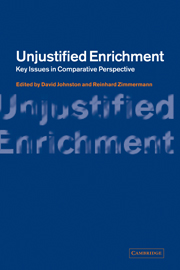Book contents
- Frontmatter
- Contents
- List of contributors
- Preface
- Table of cases
- List of abbreviations
- I Introduction
- II Enrichment ‘without legal ground’ or unjust factor approach
- III Failure of consideration
- IV Duress and fraud
- V Change of position
- VI Illegality
- VII Encroachment and restitution for wrongs
- VIII Improvements
- IX Discharge of another person's debt
- X Third-party enrichment
- XI Proprietary issues
- XII Taxonomy
- 22 Taxonomy: does it matter?
- 23 Rationality, nationality and the taxonomy of unjustified enrichment
- Index
23 - Rationality, nationality and the taxonomy of unjustified enrichment
Published online by Cambridge University Press: 31 July 2009
- Frontmatter
- Contents
- List of contributors
- Preface
- Table of cases
- List of abbreviations
- I Introduction
- II Enrichment ‘without legal ground’ or unjust factor approach
- III Failure of consideration
- IV Duress and fraud
- V Change of position
- VI Illegality
- VII Encroachment and restitution for wrongs
- VIII Improvements
- IX Discharge of another person's debt
- X Third-party enrichment
- XI Proprietary issues
- XII Taxonomy
- 22 Taxonomy: does it matter?
- 23 Rationality, nationality and the taxonomy of unjustified enrichment
- Index
Summary
In an institute of law, or of any other science, the analyzing it into its constituent parts, and the arranging every article properly, is of supreme importance. One could not conceive, without experience, how greatly accurate distribution contributes to clear conception … No work of man is perfect: it is good, however, to be on the mending hand; and in every new attempt, to approach nearer and nearer to perfection. To compile a body of law, the parts intimately connected and every link hanging on a former, requires the utmost effort of human genius.
Lord Kames, Principles of Equity (3rd edition, 1773), Introduction.Setting the scene
The brief of this chapter
As Lord President Rodger has recently remarked, references to ‘taxonomy’ are ‘very much à la mode in discussions of enrichment law’. The reason is well known. The English legal system accidentally overlooked its law of unjust enrichment for several centuries and has just rediscovered it. English lawyers are now busy exploring and developing it. The resultant outburst of intellectual creativity displays the awesome strength of English legal culture. The English enrichment law revolution has had a moderately galvanising effect in Scotland.
Certainly before Robert Goff and Gareth Jones's Law of Restitution broke the English ice in 1966, there was in Scotland a complacent tendency to believe that Scots enrichment law with its Cantiere case was much more advanced than the English law with its ‘Coronation’ cases and the implied contract fiction in Sinclair v. Brougham.
- Type
- Chapter
- Information
- Unjustified EnrichmentKey Issues in Comparative Perspective, pp. 658 - 729Publisher: Cambridge University PressPrint publication year: 2002
- 1
- Cited by



